Alexander Menshikov in the Northern War and at Poltava
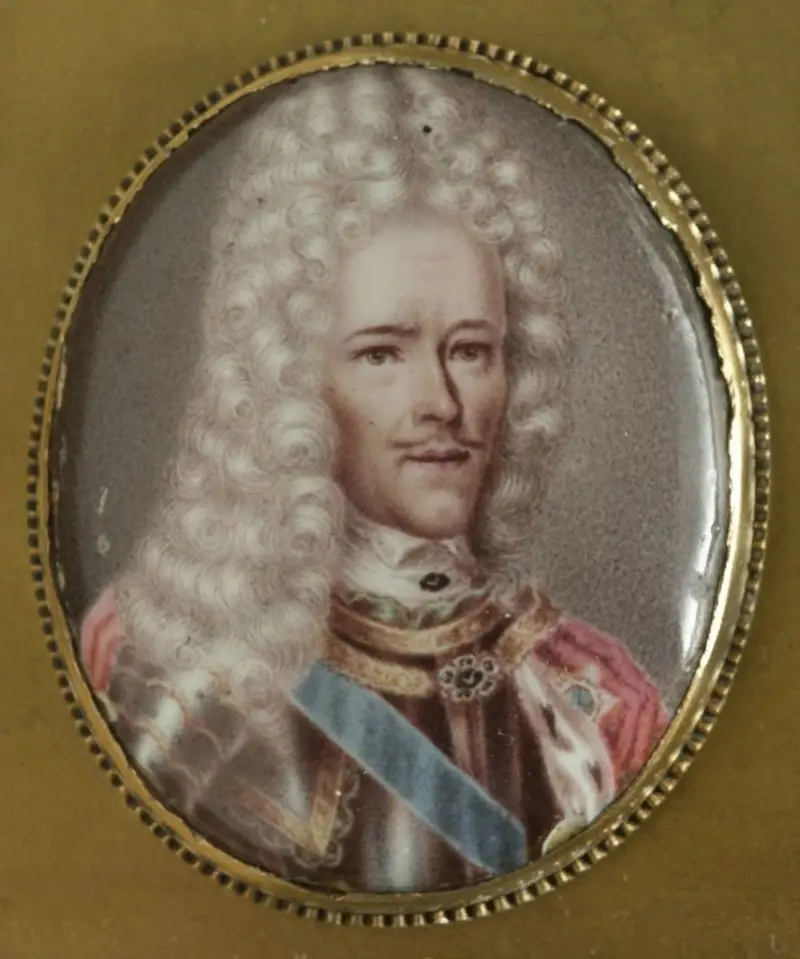
Musikiysky G. S. Portrait of A. D. Menshikov, 1709, copper, enamel
В previous article it was told about versions of the origin of Alexander Menshikov, his family, acquaintance with Peter I, tsarist service and the beginning of the Northern War. In this one we will talk about the Russian campaign of Charles XII and the famous Battle of Poltava.
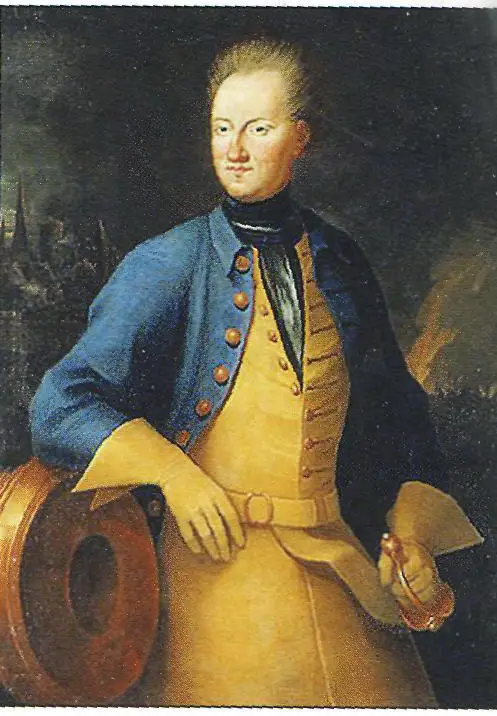
Axel Sparre Portrait of Charles XII
So, after numerous victories of Charles XII himself in Europe and defeats of his commanders from the Russians, the king finally decided to speak out against Russia himself. Swedish historians will call this campaign Russian. On the way, the Courland army of General Levengaupt was supposed to join Charles’s troops. With her came a convoy of food and ammunition, the amount of which was calculated to last for three months. In Poland, Charles XII had by this time installed a new king, Stanislav Leshchinsky, but Hetman Sinyavsky was on the side of Russia. For the war with him, Charles left 8 thousand recruits, commanded by General Crassau. At the last meeting with Leszczynski, Charles XII asked his opinion about the son of the Polish King John III - Jakub Ludwik Sobieski, who, as the Swedish monarch believed, could become "excellent king of Russia" As you can see, Karl was very serious. The condition of his army was excellent, the treasury was full, Hetman Mazepa promised to bring the Cossacks, as well as supply the Swedes with food and fodder.
The Russian command at the military council in Zholkva (near Lvov) decided “don't let there be battles in Poland", but "to torment the enemy by depriving provisions and forage».
Complications on the Don
Meanwhile, the situation on the Don sharply worsened completely inappropriately, and Alexander Menshikov became one of the culprits of this situation. By decree of Peter I, a state monopoly was introduced on the sale of salt, iron, wax, flax, bread, tobacco and some other goods. The Don Cossacks, who owned the Bakhmut saltworks, also suffered, but they still decided to make an exception for them. However, in October 1704, Menshikov lobbied for a decree according to which income from the Bakhmut saltworks was transferred to the Izyum Sloboda Cossack regiment, the commander of which was his friend, brigadier Fyodor Shidlovsky. Thus, “justice” seemed to be restored - income from the salt works was returned to the Cossacks, but not to the previous owners, but to the new ones (but the Cossacks are not the Crimean Tatars). The Donets recaptured the saltworks, the authorities responded with brutal repressions carried out by the Dolgorukov brothers - first Yuri (who was “grabbed by Kondraty” Bulavin - the expression became popular), and then Vasily. So, on October 20 (November 9), 1707, the uprising of Kondratiy Bulavin began almost “out of the blue,” and was suppressed only a year later, in November 1708.
The Russian Campaign of Charles XII
In June 1708, the Swedish army crossed the Berezina. The first clash with Russian units took place at Golovchin on July 3 of the same year. The soldiers of Repnin's left-flank division fled, for which its commander was sentenced to demotion and compensation for the cost of abandoned guns (after the Battle of Lesnaya, Repnin was reinstated in rank). But this was the last victory of the Swedes in the battle against the Russian army. In the battle near the village of Dobroye (August 29, 1708), Prince Golitsyn’s detachment defeated the vanguard units of General Roos. The ratio of losses was unprecedented: the Swedes lost up to 3000 people, the Russians - only 375. Peter I wrote:
And on September 10, 1708, both Charles XII and Peter I personally took part in the battle near the village of Raevka. A horse was killed near Charles, and only 5 drabants were next to him at the decisive moment, but fresh cavalry units of the Swedes managed to help out their king.
Meanwhile, the plan of the Russian command worked, and the Swedes experienced increasing difficulties in their movement to the east. In search of food and fodder, they began to plunder Ukrainian villages along the way. The Little Russians did not like this behavior of the “liberators from the Moscow yoke,” and they reported to Menshikov:
The Swedes responded with “fire and sword.” Charles XII's chamberlain Gustav Adlerfeld wrote in his diary at the time:
And further:
Meanwhile, Levengaupt's corps was intercepted and defeated near the village of Lesnoy (in the modern Mogilev region). One of the columns of Russian troops was commanded by Peter I, the second by Menshikov, and later they were joined by the dragoons of General Bour.
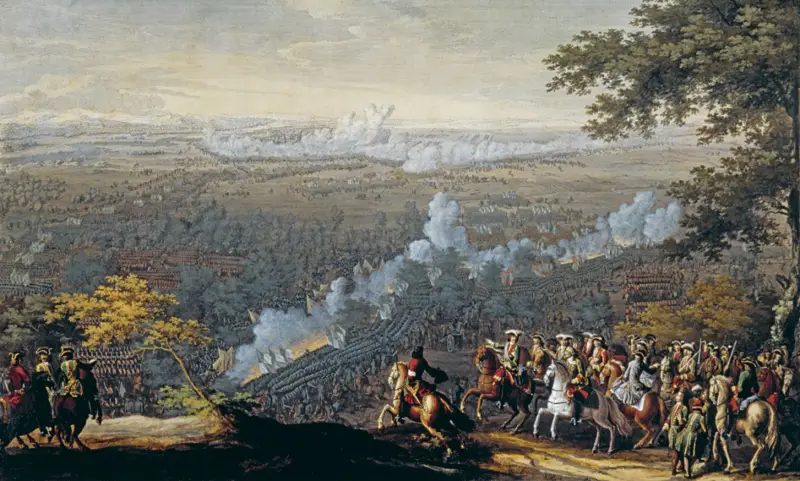
“Image of the battle near the village of Lesnoy on September 28, 1708.” Colorized engraving by N. Larmessen (based on a drawing by P. D. Martin the Younger). First quarter of the XNUMXth century
Levengaupt then had at his disposal 11 infantry, 1 artillery and 9 cavalry regiments - a total of up to 16 thousand soldiers and 16 artillery pieces. There were 18 thousand people in the Russian army, but 12 thousand took part in the battle. On the first day, Levengaupt retreated, abandoning half of the convoy; the next day, at Propoisk, the Swedes hardly fought, but simply fled, not listening to the orders of their commanders. Levenhaupt ordered the cannons to be sunk and the convoy set on fire, but the Russians got 5 thousand of the 8 thousand carts. Levenhaupt brought only 6700 tired and demoralized soldiers to Charles XII.
Since from September 28, 1708 to July 27, 1709, exactly 9 months, Peter I called the battle of Lesnaya “mother of Poltava Victoria».
Charles XII refused to believe in the strength of the Russian army, and even declared the obvious defeat at Lesnaya a victory, sending a bulletin to Stockholm with the message that Levenhaupt allegedly “successfully repelled the attacks of 40 thousand Muscovites" He was much more worried about the loss of the convoy, and the Quartermaster General of the Swedish Army, Axel Gillenkrok (Yullenkruk), wrote that the king
No one yet knew about Mazepa’s betrayal, and therefore Menshikov with 14 dragoon regiments moved from Lesnaya to the aid of the hetman. It must be said that, having entered into negotiations with Charles XII, Mazepa could not take the final step for a long time. However, on October 23, Colonel Voinarovsky came to see him and told him some rumors (“one German officer told another”) that Menshikov had become aware of the betrayal. And here the old man’s nerves could not stand it, and he ran to the Swedes.
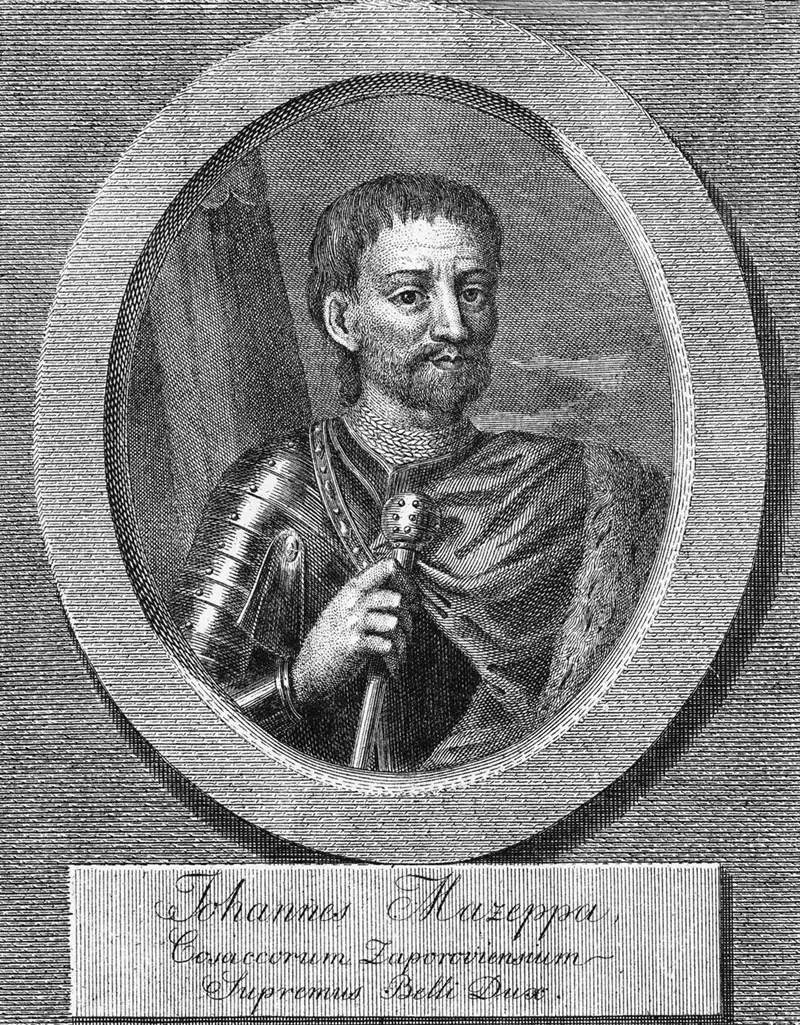
Portrait of Mazepa
The garrison of Baturin (3500 Cossacks with 70 cannons) tried to resist, but the city was taken, and the arsenal and supplies for the Swedish army were destroyed. Charles XII, who was only 70 miles away, was late. Mazepa, having learned about the fall of his capital, said:
The hetman completely lost heart when Colonel Burlyai surrendered the White Church and the hetman's treasury to D. M. Golitsyn without a fight. At this time, Mirgorod Colonel D. Apostol sent Peter I a letter with a proposal to deliver the traitor-hetman to him. And Mazepa himself, in exchange for forgiveness, promised to bring Charles XII and his generals to Peter. The tsar refused this offer, since Mazepa’s letter to Stanislav Leshchinsky had already been intercepted, in which he called on him to come to Ukraine, calling it the hereditary possession of the Polish kings. These are the kind of allies the Swedish king found himself in Ukraine—there were no better ones.
On November 17, the Swedes captured the small town of Romny - and remembered some prophecy that “the king and his army will be invincible until they capture Rome" The consonance of the names of the “Eternal City” and this insignificant fortress made an extremely unpleasant impression on everyone. Moreover, the situation of the Swedes worsened every day; with the beginning of winter, their army began to suffer not only from hunger, but also from frost. And the winter that year was harsh - not only in Russia, but throughout Europe, even the canals of Venice froze. In December alone, according to Swedish data, between a quarter and a third of soldiers suffered frostbite. However, it must be admitted that the soldiers of the Russian army suffered greatly from the frosts at that time; non-combatant losses were very high.
At the beginning of the campaign, Charles XII had an army of 35 thousand, which was joined by the remnants of Levengaupt’s corps - about 41 thousand people. In April 1709, no more than 30 thousand approached Poltava. Mazepa brought about 4 thousand more Cossacks (he promised 20 thousand). However, Karl did not trust them, fearing their defection to the Russian side. As a result, Swedish Lieutenant Veje wrote:
Let us add that the Cossacks still “participated” in the battle: by mistake they fired two volleys from muskets at the detachment with which Charles XII was - they mistook it for the advancing Russian troops.
Thus, Mazepa’s Cossacks not only did not help the Swedes, but also became a burden. But 8 thousand Cossacks fought on the Russian side in the Battle of Poltava.
The hungry soldiers of the army of Charles XII were already openly demanding “bread or death” from him, but the military reputation of the Swedish king was still very high. Everyone believed that the army of Peter I would soon be defeated. Charles XII supported these sentiments, saying on the eve of the decisive battle:
But the king was already beginning to feel uneasy. He sent letters to Poland in which General Krassau and Stanislav Leszczynski were ordered to lead the troops under their command to Ukraine.
Finally, in April 1709, the Swedish army found itself at Poltava. The garrison of this city was headed by A. S. Kelin. At his disposal were 4182 soldiers, artillerymen with 28 cannons and 2600 militia from the townspeople.
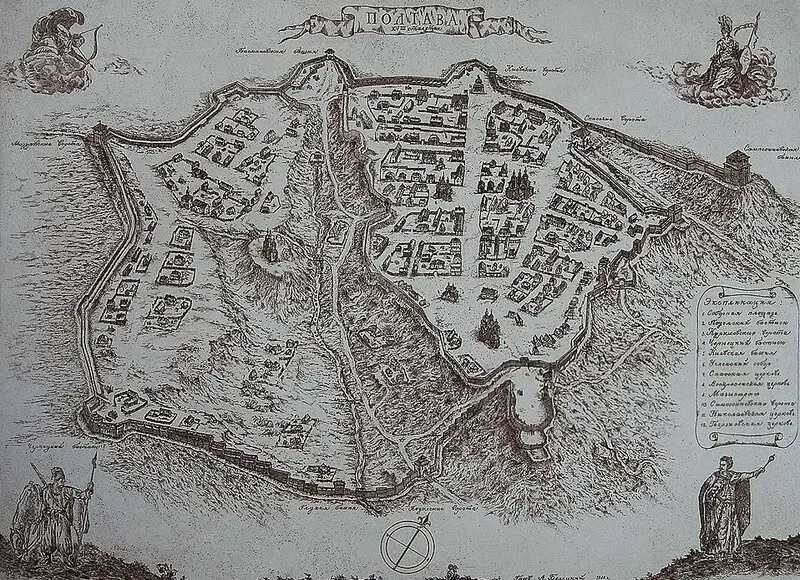
Map of Poltava at the beginning of the XNUMXth century
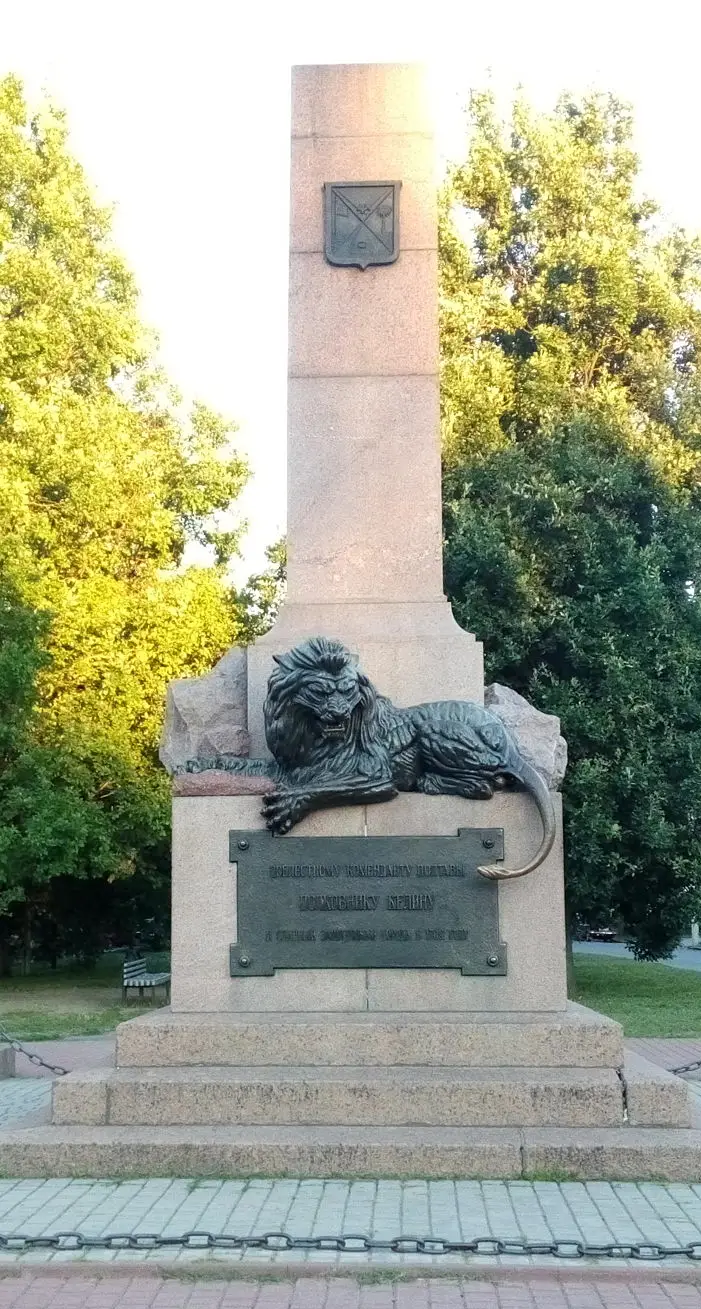
Poltava, a monument to the defenders of the city and the commandant of the fortress A. S. Kelin, was opened in 1909.
In the army of Charles XII, as we remember, there were about 30 thousand people, 2250 of them were sick or wounded. In addition, the army had about 1100 chancellery officials, approximately 4000 grooms, orderlies and workers, as well as 1700 wives and children of soldiers and officers.
There was no particular point in the siege of Poltava, but, according to Field Marshal Rönskiöld, Karl
The situation worsened after one of the Poltava defenders hit the king in the shoulder with a well-aimed throw... with a dead cat. The offended Karl said to the head of his field office, Karl Pieper:
As a result, Karl waited not for the Swedes of General Krassau and the Poles Stanislav Leschinsky, but for the army of Boris Sheremetev - yes, it was he, and not Peter I, who commanded the Russian troops at Poltava.
Tsar Peter arrived at Poltava on April 26, Russian regiments approached the city until June 20. In May, Colonel Yakovlev, taking revenge on the Cossacks for treason, captured and ravaged the Chertomlytsky Sich (at the confluence of its right tributary, the Chertomlyk, with the Dnieper). The Swedish army was surrounded: in the south was Poltava, which was never taken, in the north was the camp of Sheremetev and Peter I (42 thousand soldiers and officers), and cavalry detachments of generals Bour and Genskin were operating in the east and west. Charles XII, on the night of June 16-17, during a stupid minor skirmish, was wounded in the left heel and could not walk. Field Marshal Carl Gustav Rönschild, who had not yet fully recovered from the wound received during the assault on the town of Veprik, was entrusted with the duties of commander. And the commander of the infantry units, General Levengaupt, suffered from diarrhea.
On June 26, Charles XII held a military council, at which Rönschild, supported by other commanders, declared that the army was disintegrating before our eyes, and there were only enough cannonballs, bullets and gunpowder for one big battle. And Charles XII finally decided to give the order to prepare troops for a decisive battle: the Swedes were to attack the Russian army, which was numerically superior to them. It must be said that Peter I, who was well aware of the benefits of his position, so as not to frighten the enemy with the size of his army, on the day of the battle left 6 infantry regiments, Skoropadsky’s Cossacks and Khan Ayuki’s Kalmyks in the camp, and sent three battalions to Poltava.
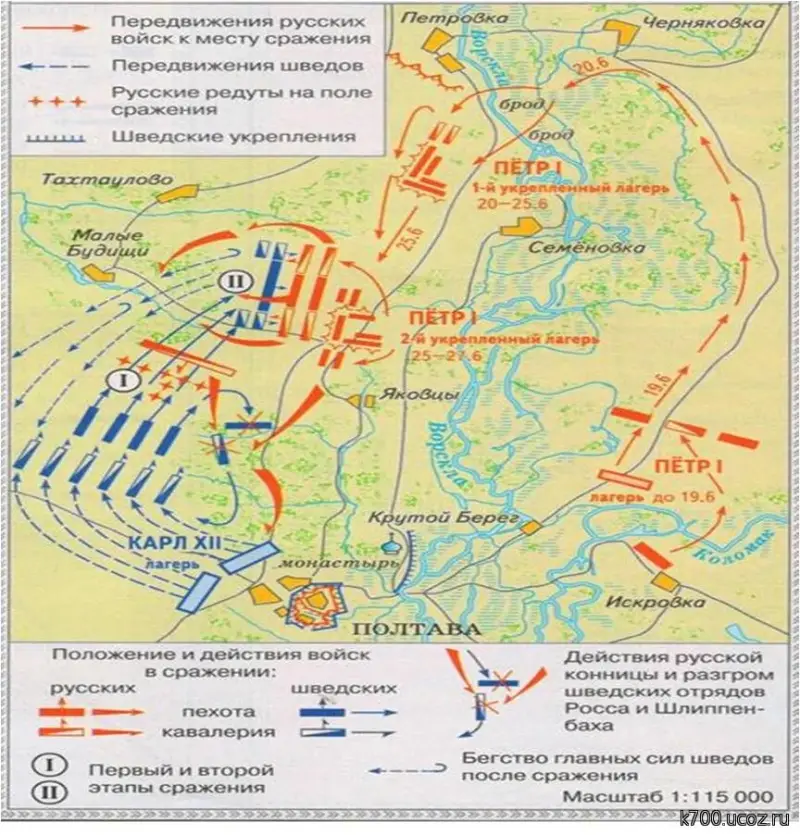
The scheme of the Poltava battle
In order to simply approach the Russian troops, the Swedes had to pass through the field between the Budishchensky and Yakovetsky forests (width - from two to three miles), on which 10 redoubts were built with guns installed on them - a total of 102 guns.
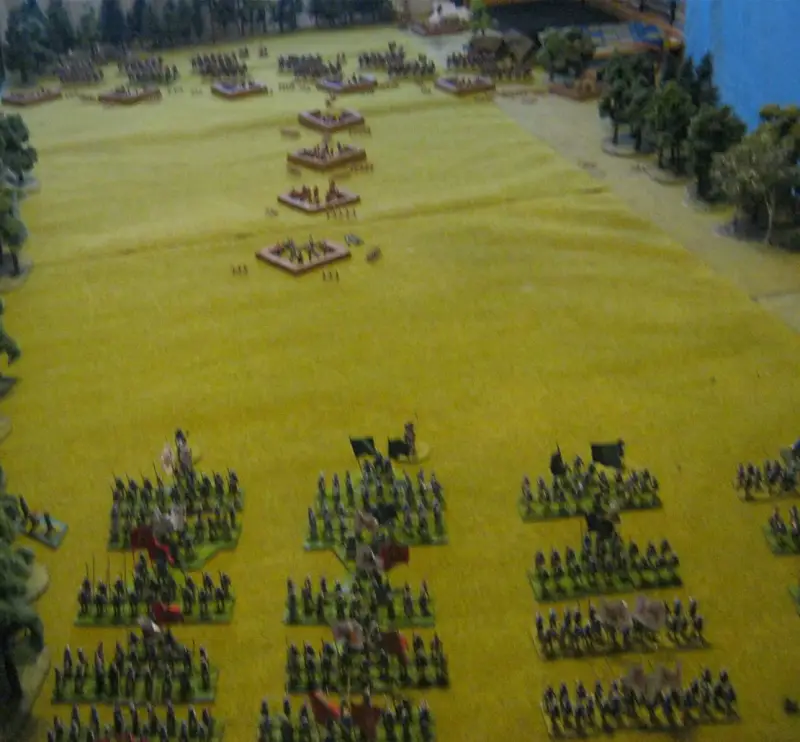
The layout depicting the battlefield of Poltava. Poltava, Museum of the Battle of Poltava
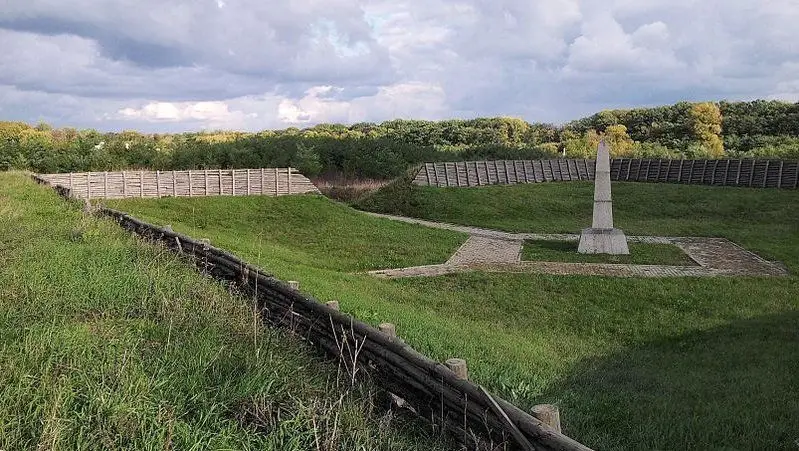
Field of the Poltava Battle, restored redoubt - a quadrangular defensive fortification with ramparts and ditches, surrounded by slingshots, the length of one face of the redoubt ranged from 50 to 70 meters
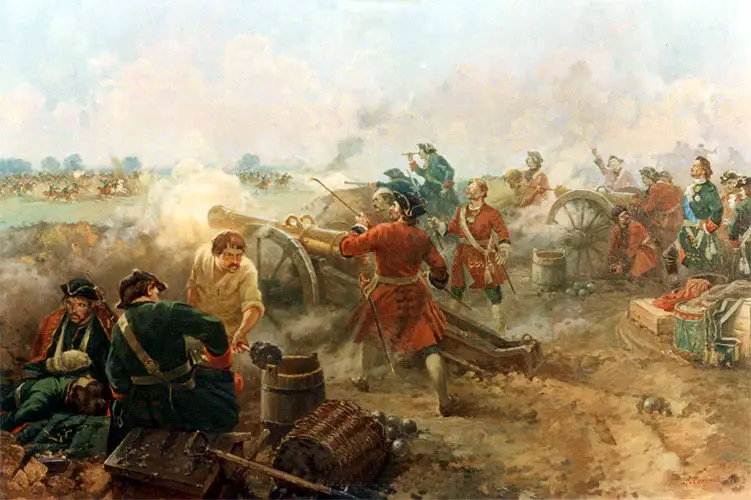
A. Semenov and A. Sokolov. Russian artillery in the Battle of Poltava
The battle began in the early morning of June 27 (July 8): the Swedes took only two redoubts, they simply bypassed the rest - and then again came under fire from their guns during the retreat. Nevertheless, the Swedes reached the line of Russian troops, where they were met by the cavalry units of Alexander Menshikov. By the way, three horses were killed near Menshikov that day.
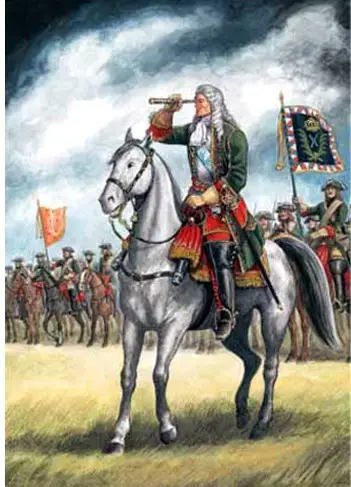
Yu. Kashtanov. Cavalry Commander Alexander Menshikov
Carried away by the attack of enemy infantry and dragoons, he ignored two orders to withdraw. As a result, the rebuilt Swedish cavalrymen drove his detachment north - straight into the ravine. Menshikov was unwittingly saved from certain death by the cavalrymen by Rönschild, who ordered his cavalry to turn back. After this, the Swedes spent three hours gathering units for the decisive attack. Oddly enough, Rönschild and Charles XII were still very optimistic. The field marshal, having accepted congratulations from the king on the successful completion of the first stage of the battle, when asked whether enemy units were going beyond the boundaries of their camp to fight, replied:
But General Levengaupt recalled that when he saw the Russian system, he “my heart was cut as if by a knife":
And even the civilian official Pieper said then:
Field Marshal Rönschild soon learned that the “audacity” of the Russians exceeded all his expectations. At about 9 o'clock in the morning, the Russian commander-in-chief Boris Sheremetev withdrew the troops from the camp, Peter I took command of one of the second line divisions.
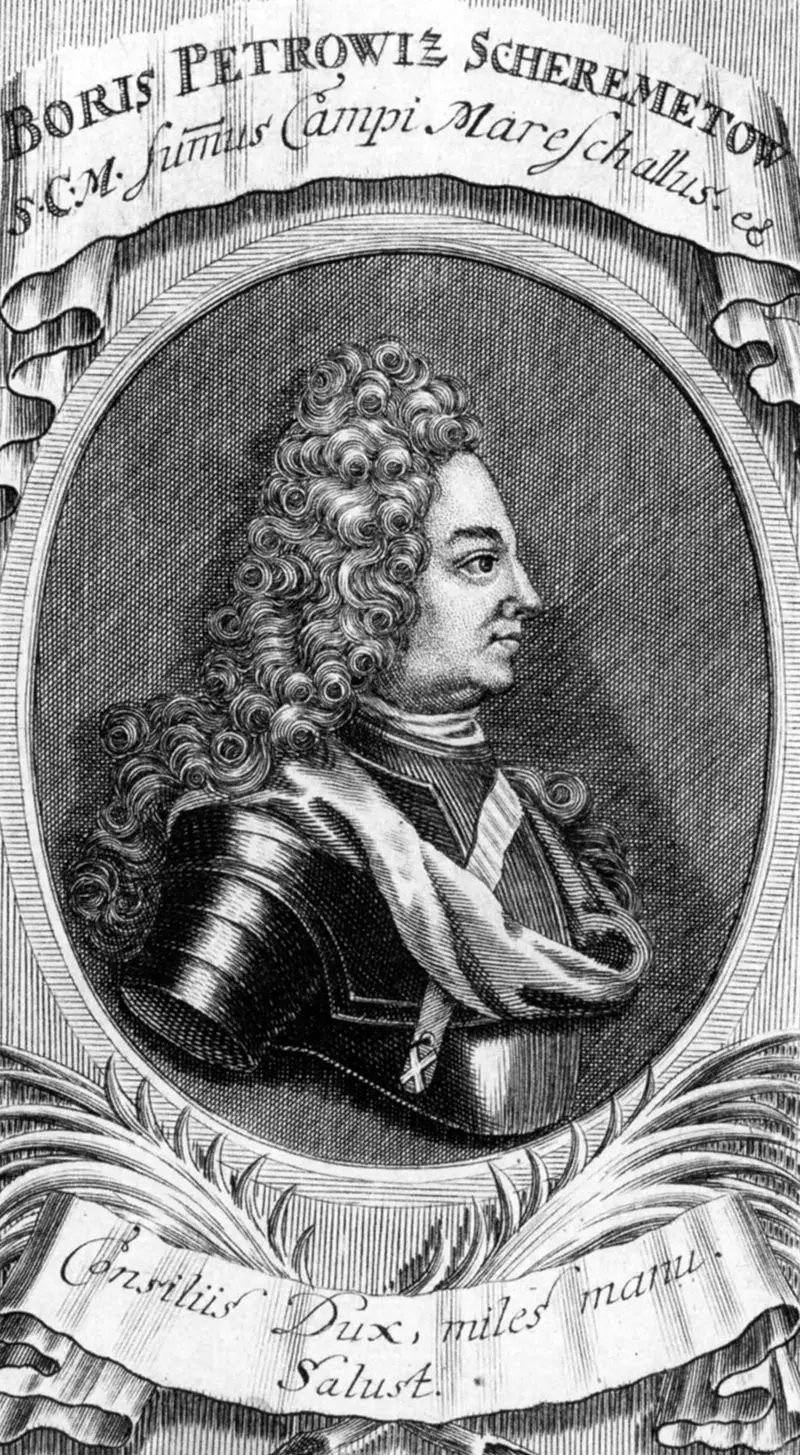
Portrait of Count B.P. Sheremetev, engraving by an unknown German master, circa 1710
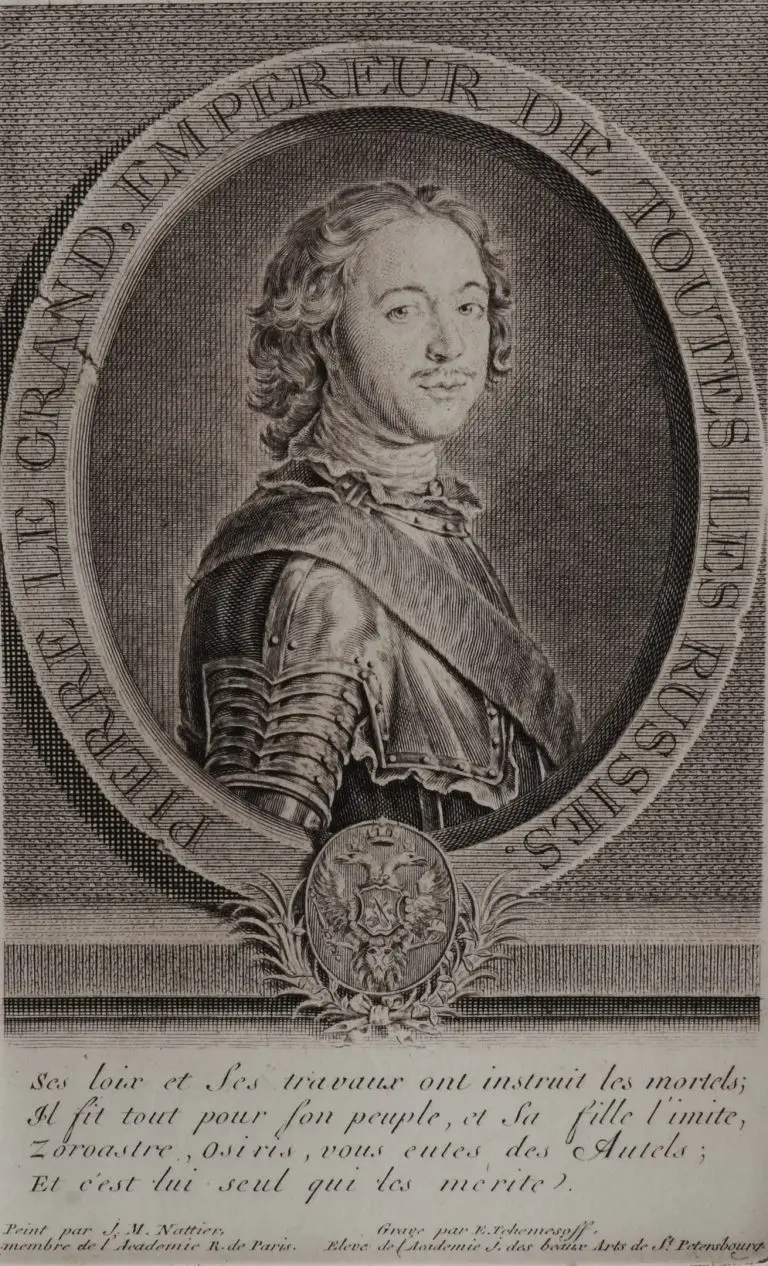
Chemesov E. P. Portrait of Peter I (engraving from Nantier’s original), 1717
But, following the order, the Swedes went forward and attacked the Russians with “an unprecedented fury" On the right flank, the Carolinians, with a bayonet strike, almost completely destroyed the first battalion of the Novgorod regiment and captured 15 guns. To restore the broken line, Peter I personally led the second battalion into the attack; a Swedish bullet pierced his hat, another hit the saddle of his favorite horse Lisette.
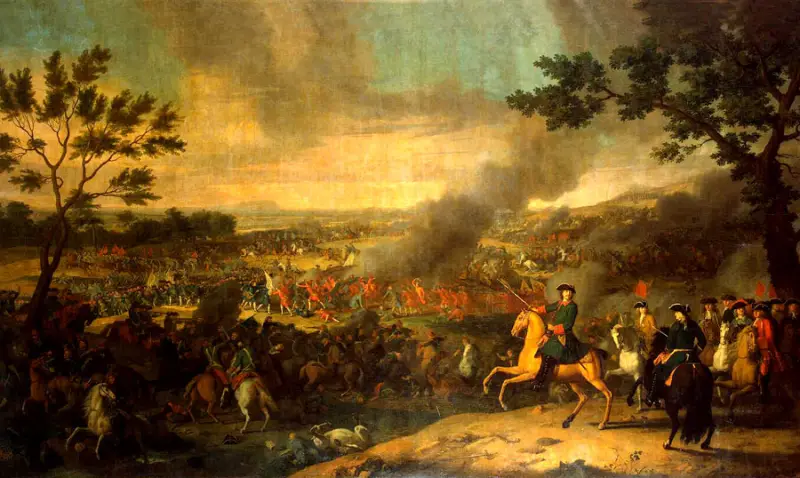
Louis Caravac. "Peter I in the Battle of Poltava"
The battalions of the Moscow, Kazan, Pskov, Siberian and Butyrsky regiments also retreated.
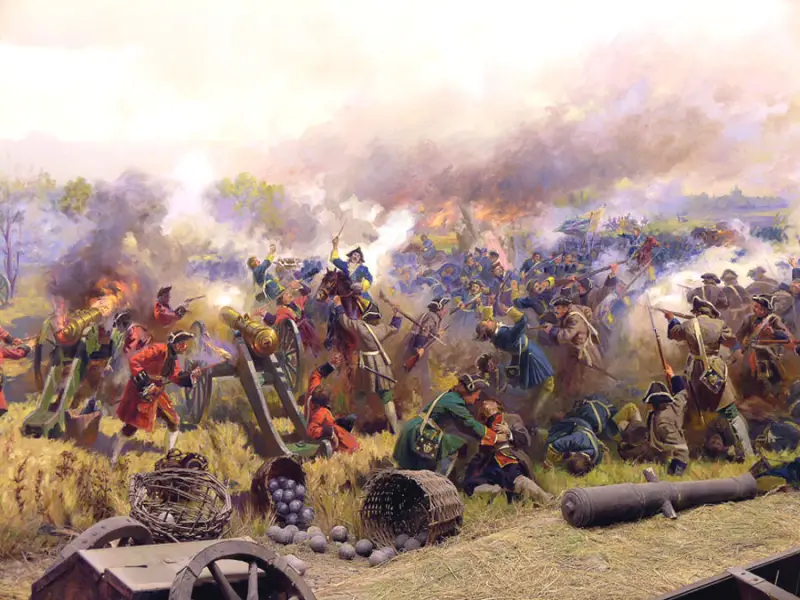
Fragment of the diorama “Battle of Poltava” (made by artists of the N. Grekov studio)
According to the combat regulations of the Swedish army, cavalry should now have been brought into battle, but the Russian infantry lined up in a square did not run, and then the Swedish cavalry was driven away by Menshikov’s dragoons. And at this time, on the other flank, the Semyonovsky, Preobrazhensky, Ingermanland and Astrakhan regiments struck, which overturned the Swedish units that had not yet entered the battle. This was the beginning of the defeat, the Swedes fled, the official Russian report says that they were beaten then "like cattle" In the Upland regiment, out of 700 people, 14 survived, in the Skaraborg battalion - 40 out of 500.
Charles XII only miraculously did not die or be captured. Next to him, 20 drabants, about 80 guardsmen of the North Skonsky regiment, one of the doctors and several courtiers, including the chamberlain and historiographer Gustaf Adlerfelt, as well as the leading horse carrying the stretcher and the other on which he was placed, were killed.
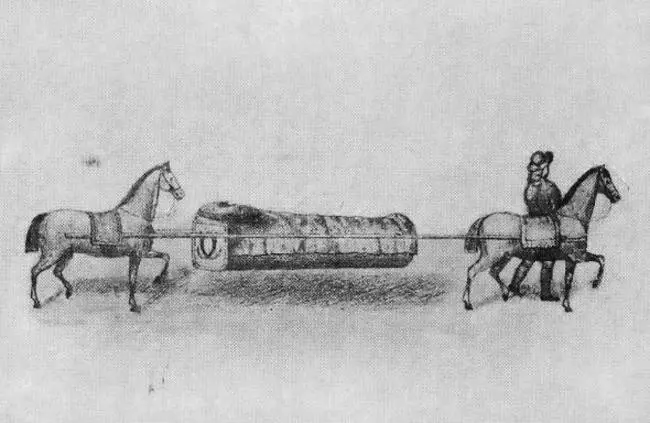
A fragment of an engraving depicting a stretcher of Charles XII
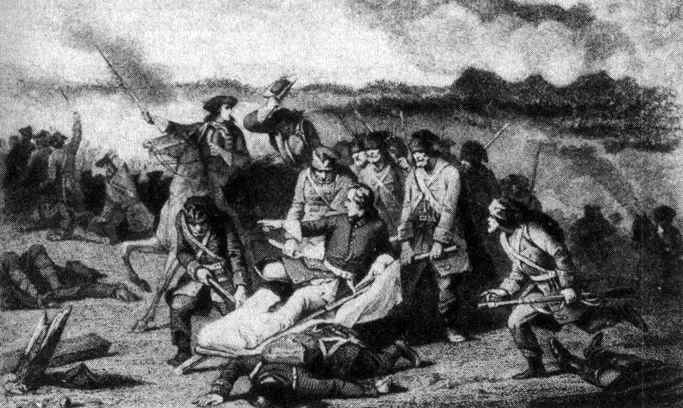
“Charles XII on the Battle of Poltava”, a drawing by an unknown artist
Chaplain Agrell later claimed that if the Russians had not stopped and pursued Charles’s army, not a single Swede would haveI wouldn't be able to carry my feet" But Peter, who was in a state of euphoria, simply forgot to give such an order. Having cordially received Rönschild, Schlippenbach, Stackelberg, Roos, Hamilton and Maximilian of Württemberg in his tent, he said:
After this he returned them weapon.
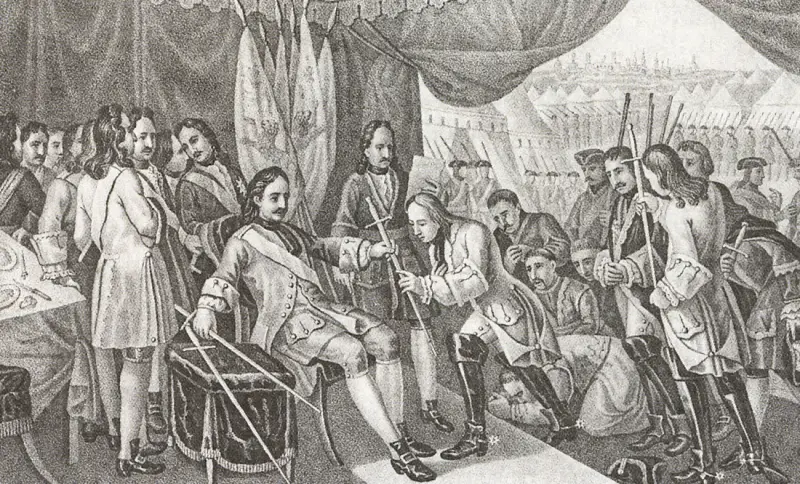
After the Poltava victory, Peter I returns swords to captured Swedish generals
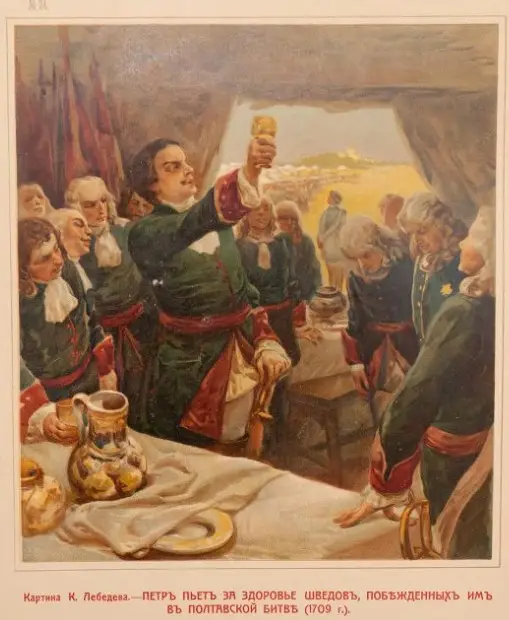
K. V. Lebedev. Peter I drinks to the health of the Swedes defeated in the Battle of Poltava
Nevertheless, the victory was decisive and even unprecedented: the Swedes lost 6900 people killed (including 300 officers), 2800 soldiers and officers, one field marshal and 4 generals were captured. Various researchers estimate the number of wounded from 1500 to 2800 people. The total losses of the Swedish army (killed and captured) reached 57%. In Moscow, the captured Swedes were then escorted through the streets for three days. 4 Swedish cannons, 137 banners, the royal archive and 2 million gold Saxon thalers were captured.
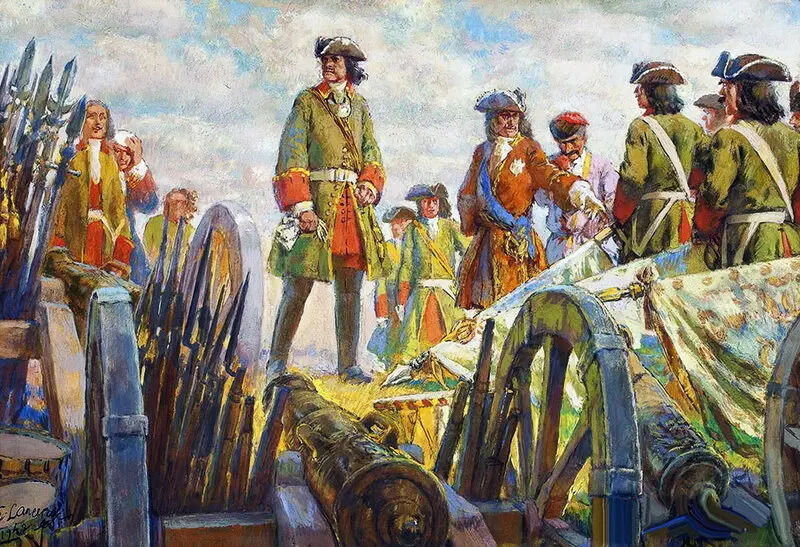
Evgeny Lansere. Peter I inspects the trophies of Russian troops taken from the Swedes during the Battle of Poltava
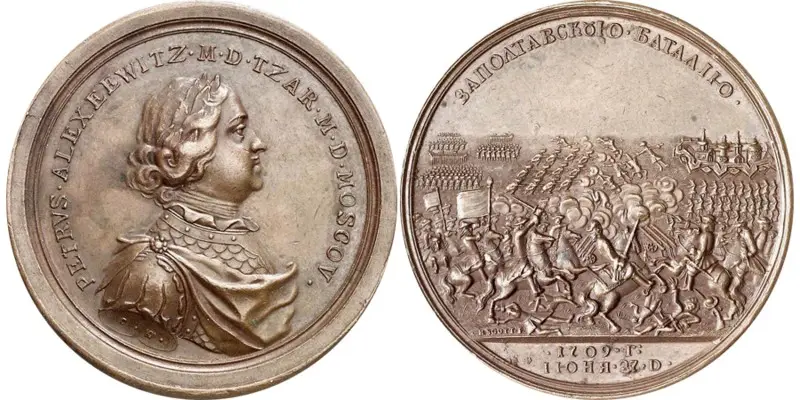
Medal "For the Poltava battle"
Several hundred Cossacks were also captured and executed for treason. Two defectors, Mühlenfeld and Schultz, were impaled.
The Russians lost 1345 people killed (that is, almost 5 times less than the Swedes) and 3920 wounded.
Charles XII continued to set records of inadequacy. He did not look dejected and insisted that the “embarrassment” was not a big deal. To Sister Ulrike Eleonora he wrote:
But the king’s mood changed sharply when he learned that Field Marshal Rönschild, the head of the field office, Pieper, and his personal friend Maximilian of Württemberg (“The Little Prince”) had been captured. Those close to Charles relay the words he said:
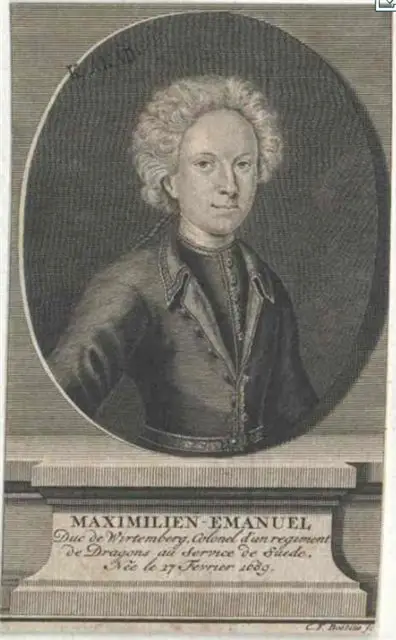
Maximilian Emanuel, Duke of Württemberg-Winnenthal, "Little Prince", "brother in arms" of Charles XII. At the time of capture - Colonel of the Skon Dragoon Regiment
But even at the end of August 1709, Charles XII wrote to Stockholm:
Charles’s subjects learned from foreign newspapers that the Swedish army of Charles XII, which had set off on the Russian campaign, no longer existed.
In the next article we will continue the story about the Northern War and the participation of Alexander Menshikov in it.
Information